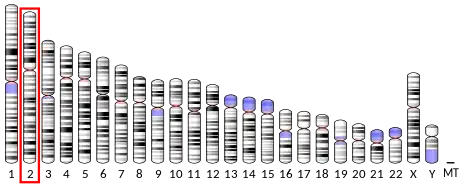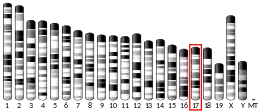Speedy protein A is a protein that in humans is encoded by the SPDYA gene.[5][6][7][8]
Interactions
References
- 1 2 3 GRCh38: Ensembl release 89: ENSG00000163806 - Ensembl, May 2017
- 1 2 3 GRCm38: Ensembl release 89: ENSMUSG00000052525 - Ensembl, May 2017
- ↑ "Human PubMed Reference:". National Center for Biotechnology Information, U.S. National Library of Medicine.
- ↑ "Mouse PubMed Reference:". National Center for Biotechnology Information, U.S. National Library of Medicine.
- ↑ Porter LA, Dellinger RW, Tynan JA, Barnes EA, Kong M, Lenormand JL, Donoghue DJ (Apr 2002). "Human Speedy: a novel cell cycle regulator that enhances proliferation through activation of Cdk2". The Journal of Cell Biology. 157 (3): 357–66. doi:10.1083/jcb.200109045. PMC 2173287. PMID 11980914.
- ↑ Barnes EA, Porter LA, Lenormand JL, Dellinger RW, Donoghue DJ (Jul 2003). "Human Spy1 promotes survival of mammalian cells following DNA damage". Cancer Research. 63 (13): 3701–7. PMID 12839962.
- ↑ Cheng A, Xiong W, Ferrell JE, Solomon MJ (Jan 2005). "Identification and comparative analysis of multiple mammalian Speedy/Ringo proteins". Cell Cycle. 4 (1): 155–65. doi:10.4161/cc.4.1.1347. PMID 15611625.
- ↑ "Entrez Gene: SPDYA speedy homolog A (Drosophila)".
- ↑ Porter LA, Kong-Beltran M, Donoghue DJ (Sep 2003). "Spy1 interacts with p27Kip1 to allow G1/S progression". Molecular Biology of the Cell. 14 (9): 3664–74. doi:10.1091/mbc.E02-12-0820. PMC 196558. PMID 12972555.
Further reading
- Porter LA, Kong-Beltran M, Donoghue DJ (Sep 2003). "Spy1 interacts with p27Kip1 to allow G1/S progression". Molecular Biology of the Cell. 14 (9): 3664–74. doi:10.1091/mbc.E02-12-0820. PMC 196558. PMID 12972555.
- Gastwirt RF, Slavin DA, McAndrew CW, Donoghue DJ (Nov 2006). "Spy1 expression prevents normal cellular responses to DNA damage: inhibition of apoptosis and checkpoint activation". The Journal of Biological Chemistry. 281 (46): 35425–35. doi:10.1074/jbc.M604720200. PMID 16951407.
- McAndrew CW, Gastwirt RF, Meyer AN, Porter LA, Donoghue DJ (Aug 2007). "Spy1 enhances phosphorylation and degradation of the cell cycle inhibitor p27". Cell Cycle. 6 (15): 1937–45. doi:10.4161/cc.6.15.4520. PMID 17671428.
This article is issued from Wikipedia. The text is licensed under Creative Commons - Attribution - Sharealike. Additional terms may apply for the media files.



